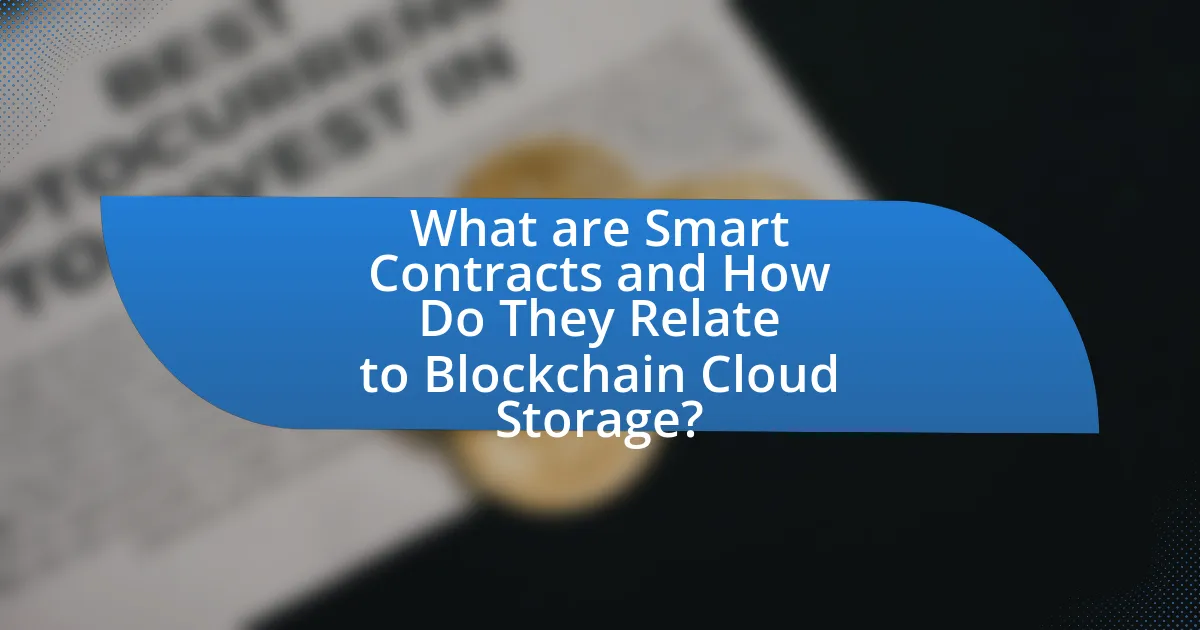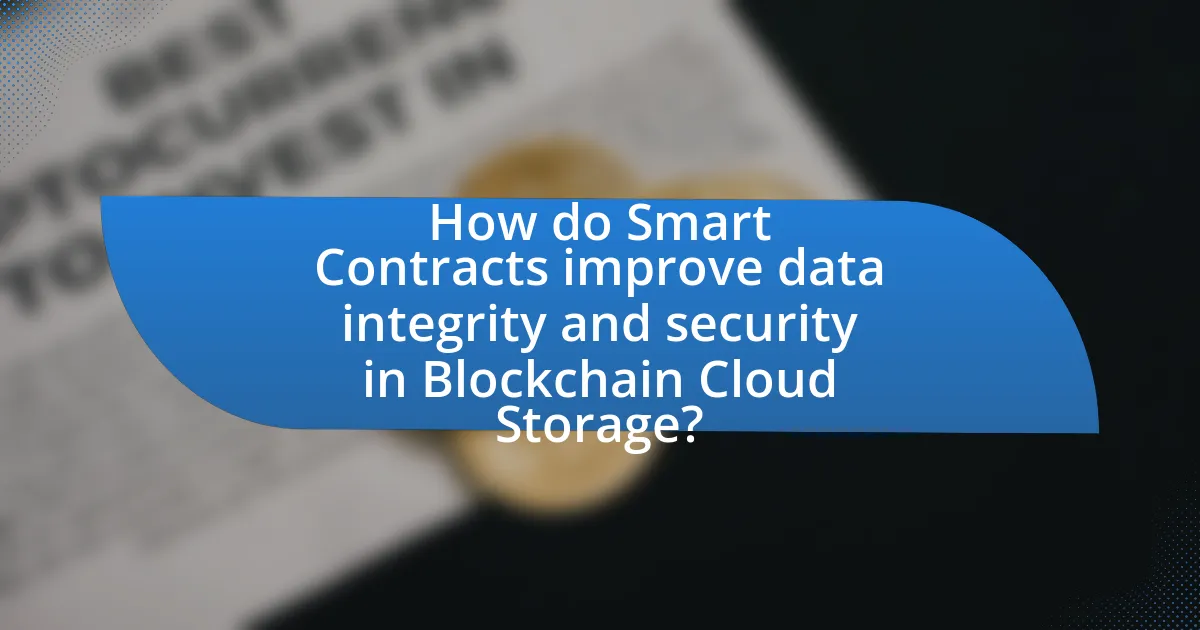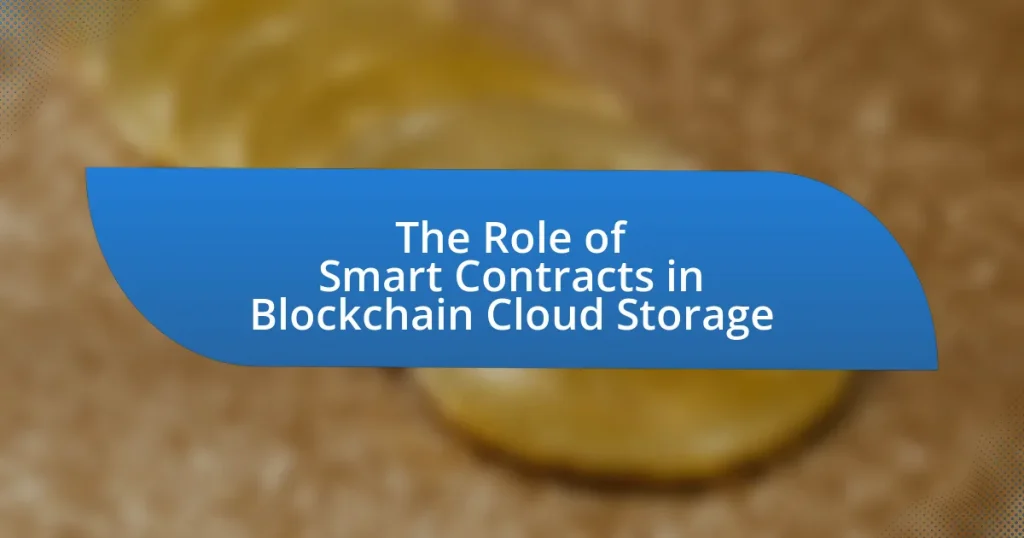Smart contracts are self-executing agreements with terms encoded in blockchain technology, playing a crucial role in blockchain cloud storage by automating data management processes. They enhance efficiency, security, and transparency by eliminating intermediaries and ensuring that data storage agreements are executed based on predefined conditions. Key components of smart contracts include code, execution environment, and state, which work together to enforce agreements and manage data access rights. The article explores how smart contracts improve data integrity, facilitate compliance with regulatory requirements, and address challenges such as scalability and security vulnerabilities, while also highlighting future trends and emerging use cases in cloud storage applications.

What are Smart Contracts and How Do They Relate to Blockchain Cloud Storage?
Smart contracts are self-executing contracts with the terms of the agreement directly written into code, operating on blockchain technology. They facilitate, verify, and enforce the negotiation or performance of a contract without the need for intermediaries. In the context of blockchain cloud storage, smart contracts automate the management of data storage agreements, ensuring that data is stored, accessed, and shared according to predefined conditions. For instance, a smart contract can automatically allocate storage space and manage payments based on usage, enhancing efficiency and security. This relationship is validated by the fact that platforms like Ethereum enable developers to create decentralized applications that utilize smart contracts for managing cloud storage solutions, thus streamlining operations and reducing costs.
How do Smart Contracts function within the blockchain ecosystem?
Smart contracts function as self-executing contracts with the terms of the agreement directly written into code on the blockchain. They automate processes by executing predefined actions when specific conditions are met, ensuring trust and transparency without the need for intermediaries. For instance, in blockchain cloud storage, smart contracts can manage data access rights, automatically granting or revoking permissions based on user-defined criteria. This functionality is supported by the immutable nature of blockchain, which guarantees that once deployed, the smart contract cannot be altered, thus providing a secure and reliable framework for transactions and agreements.
What are the key components of Smart Contracts?
The key components of smart contracts include code, execution environment, and state. The code defines the rules and conditions of the contract, typically written in programming languages like Solidity for Ethereum. The execution environment, often a blockchain platform, facilitates the deployment and execution of the smart contract, ensuring that it operates in a decentralized manner. The state represents the current status of the contract, including variables and data that can change as the contract executes. These components work together to automate processes and enforce agreements without intermediaries, enhancing efficiency and trust in transactions.
How do Smart Contracts ensure security and transparency?
Smart contracts ensure security and transparency by automating and enforcing agreements through code on a blockchain. This automation eliminates the need for intermediaries, reducing the risk of fraud and manipulation. The use of cryptographic techniques ensures that the contract’s terms are immutable and verifiable, meaning once deployed, they cannot be altered without consensus from all parties involved. Additionally, all transactions executed by smart contracts are recorded on a public ledger, providing an auditable trail that enhances transparency. This combination of automation, cryptography, and public visibility creates a secure environment for executing agreements in blockchain cloud storage.
What role do Smart Contracts play in managing cloud storage transactions?
Smart contracts automate and enforce cloud storage transactions by executing predefined agreements without the need for intermediaries. They facilitate secure data storage, retrieval, and payment processes through blockchain technology, ensuring transparency and immutability. For instance, when a user uploads data, a smart contract can automatically verify the transaction, allocate storage space, and manage payment based on usage, thereby reducing the risk of fraud and enhancing efficiency. This functionality is supported by the decentralized nature of blockchain, which allows for trustless interactions between users and service providers.
How do Smart Contracts automate storage agreements?
Smart contracts automate storage agreements by executing predefined conditions automatically when specific criteria are met. These self-executing contracts eliminate the need for intermediaries, ensuring that terms such as payment and access rights are enforced transparently and efficiently. For instance, when a user pays for storage, the smart contract verifies the transaction on the blockchain and grants access to the storage space without manual intervention. This process enhances security and reduces the risk of disputes, as all actions are recorded on an immutable ledger, providing a clear audit trail.
What are the implications of using Smart Contracts for data access and permissions?
The implications of using Smart Contracts for data access and permissions include enhanced security, automation of access control, and increased transparency. Smart Contracts enforce predefined rules for data access, ensuring that only authorized users can retrieve or modify data, which significantly reduces the risk of unauthorized access. Additionally, they automate the process of granting permissions, eliminating the need for intermediaries and reducing the potential for human error. This automation leads to faster transactions and improved efficiency in managing data permissions. Furthermore, the transparency provided by Smart Contracts allows all parties to verify access rights and actions taken on the data, fostering trust among users. These implications are supported by the inherent characteristics of blockchain technology, which ensures that all transactions are immutable and auditable.
What advantages do Smart Contracts provide in Blockchain Cloud Storage?
Smart contracts provide automation, security, and transparency in blockchain cloud storage. They automate processes such as data access and payment transactions, reducing the need for intermediaries and minimizing human error. Security is enhanced through cryptographic protocols, ensuring that data is tamper-proof and accessible only to authorized users. Additionally, smart contracts facilitate transparent transactions, as all actions are recorded on the blockchain, allowing for easy auditing and verification. These advantages lead to increased efficiency and trust in cloud storage solutions.
How do Smart Contracts enhance efficiency in cloud storage operations?
Smart contracts enhance efficiency in cloud storage operations by automating processes and reducing the need for intermediaries. They facilitate secure, transparent transactions between users and service providers, ensuring that data storage agreements are executed automatically when predefined conditions are met. For instance, a smart contract can automatically allocate storage space and manage payments based on usage metrics, minimizing manual oversight and errors. This automation leads to faster transaction times and lower operational costs, as evidenced by studies showing that blockchain-based solutions can reduce administrative overhead by up to 30%.
What cost benefits can be realized through Smart Contracts in cloud storage?
Smart contracts in cloud storage can significantly reduce costs by automating transactions and eliminating intermediaries. By utilizing smart contracts, organizations can streamline processes such as data access, storage agreements, and payment settlements, which traditionally involve multiple parties and associated fees. For instance, a study by the World Economic Forum estimates that blockchain technology, including smart contracts, could reduce transaction costs by up to 40% in various sectors. Additionally, smart contracts enhance security and transparency, minimizing the risk of fraud and disputes, which can lead to further cost savings in legal and administrative expenses.

How do Smart Contracts improve data integrity and security in Blockchain Cloud Storage?
Smart contracts enhance data integrity and security in blockchain cloud storage by automating and enforcing agreements without the need for intermediaries. They ensure that data is only accessible to authorized users through cryptographic keys, which prevents unauthorized access and tampering. Additionally, smart contracts can automatically verify and validate transactions, ensuring that data remains consistent and accurate across all nodes in the blockchain network. This decentralized verification process significantly reduces the risk of data breaches and fraud, as evidenced by the immutable nature of blockchain technology, where any alteration to data is easily traceable and requires consensus from the network participants.
What mechanisms do Smart Contracts use to protect data integrity?
Smart contracts utilize cryptographic hashing, consensus algorithms, and immutable ledger technology to protect data integrity. Cryptographic hashing ensures that any alteration in the data results in a different hash, making unauthorized changes easily detectable. Consensus algorithms, such as Proof of Work or Proof of Stake, require agreement among network participants before any transaction is validated, preventing fraudulent activities. Additionally, the immutable nature of blockchain means that once data is recorded, it cannot be altered or deleted, further safeguarding its integrity. These mechanisms collectively ensure that data remains accurate and trustworthy within blockchain cloud storage systems.
How do Smart Contracts prevent unauthorized access to stored data?
Smart contracts prevent unauthorized access to stored data by utilizing cryptographic techniques and predefined rules that govern data access. These contracts are executed on blockchain networks, ensuring that only authorized parties can interact with the data based on the conditions set within the contract. For instance, access permissions can be encoded into the smart contract, requiring specific credentials or actions to be met before granting access. This mechanism is reinforced by the immutable nature of blockchain, which records all transactions and changes, making it difficult for unauthorized users to alter access permissions or data without detection.
What role does encryption play in Smart Contracts for cloud storage?
Encryption is essential in Smart Contracts for cloud storage as it ensures data confidentiality and integrity. By encrypting data before it is stored in the cloud, Smart Contracts can protect sensitive information from unauthorized access and tampering. This is particularly important in decentralized environments where multiple parties interact without a central authority. Furthermore, encryption algorithms, such as AES (Advanced Encryption Standard), provide a robust framework for securing data, making it unreadable to anyone without the appropriate decryption keys. This security measure is crucial for maintaining trust among users and ensuring compliance with data protection regulations.
How do Smart Contracts facilitate compliance and regulatory requirements?
Smart contracts facilitate compliance and regulatory requirements by automating the enforcement of rules and conditions defined in legal agreements. These self-executing contracts operate on blockchain technology, ensuring that all transactions are transparent, immutable, and traceable, which enhances accountability. For instance, smart contracts can automatically verify compliance with data protection regulations, such as the General Data Protection Regulation (GDPR), by ensuring that personal data is processed only under specified conditions. This capability reduces the risk of human error and increases efficiency in compliance processes, as evidenced by the use of smart contracts in various industries to streamline regulatory reporting and audits.
What are the compliance challenges addressed by Smart Contracts?
Smart contracts address compliance challenges by automating regulatory adherence and ensuring transparency in transactions. They facilitate the enforcement of legal agreements through self-executing code, which reduces the risk of human error and fraud. For instance, smart contracts can automatically verify compliance with data protection regulations, such as GDPR, by ensuring that data handling processes are executed according to predefined rules. This automation not only streamlines compliance processes but also provides an immutable record of transactions, which can be audited for regulatory purposes.
How can Smart Contracts be designed to meet specific regulatory standards?
Smart contracts can be designed to meet specific regulatory standards by incorporating compliance mechanisms directly into their code. This includes embedding rules that align with legal requirements, such as KYC (Know Your Customer) and AML (Anti-Money Laundering) protocols, which ensure that only verified users can engage in transactions.
Additionally, smart contracts can utilize oracles to access real-time regulatory updates, allowing them to adapt to changing laws and regulations automatically. For instance, a smart contract governing a financial transaction can be programmed to halt execution if it detects that a user is on a sanctions list, thereby ensuring compliance with international regulations.
Furthermore, auditing features can be integrated into smart contracts to provide transparency and traceability, which are essential for regulatory oversight. By maintaining a detailed log of all transactions and changes, these contracts can facilitate audits and demonstrate compliance with applicable laws.
The implementation of these features not only enhances the legal standing of smart contracts but also builds trust among users and regulators, as evidenced by the increasing adoption of blockchain technology in regulated industries such as finance and healthcare.

What are the challenges and limitations of using Smart Contracts in Blockchain Cloud Storage?
The challenges and limitations of using Smart Contracts in Blockchain Cloud Storage include scalability issues, security vulnerabilities, and legal enforceability. Scalability is a significant concern as blockchain networks can become congested, leading to slower transaction times and higher costs. Security vulnerabilities arise from coding errors or exploits that can compromise the integrity of the smart contract, potentially resulting in data loss or unauthorized access. Additionally, the legal enforceability of smart contracts can be problematic, as existing legal frameworks may not adequately address the unique aspects of blockchain technology, leading to uncertainties in dispute resolution and contract execution. These challenges highlight the need for ongoing development and regulatory clarity in the integration of smart contracts within blockchain cloud storage solutions.
What technical challenges do developers face when implementing Smart Contracts?
Developers face several technical challenges when implementing Smart Contracts, including security vulnerabilities, scalability issues, and interoperability concerns. Security vulnerabilities arise from coding errors or flaws in the contract logic, which can lead to exploits, as evidenced by the DAO hack in 2016 where a vulnerability allowed attackers to drain funds. Scalability issues occur because many blockchain networks struggle to handle a high volume of transactions efficiently, impacting the performance of Smart Contracts. Interoperability concerns stem from the difficulty of integrating Smart Contracts across different blockchain platforms, which can hinder their functionality and adoption. These challenges necessitate rigorous testing, optimization, and adherence to best practices in Smart Contract development.
How do scalability issues affect Smart Contracts in cloud storage?
Scalability issues significantly hinder the performance and efficiency of smart contracts in cloud storage by limiting transaction throughput and increasing latency. When a blockchain network experiences high demand, the time and resources required to process smart contract transactions can escalate, leading to delays in execution and higher transaction fees. For instance, Ethereum, a widely used platform for smart contracts, has faced congestion during peak usage, resulting in slower transaction times and increased costs, which directly impacts the usability of smart contracts in cloud storage applications. This limitation can deter developers from deploying smart contracts, as the unpredictability of performance may compromise the reliability and user experience of cloud storage solutions.
What are the potential risks associated with Smart Contracts?
The potential risks associated with smart contracts include coding errors, security vulnerabilities, and lack of legal clarity. Coding errors can lead to unintended consequences, as seen in the DAO hack of 2016, where a vulnerability in the smart contract code resulted in the loss of $60 million worth of Ether. Security vulnerabilities, such as reentrancy attacks, can exploit flaws in the contract’s logic, compromising the integrity of transactions. Additionally, the lack of legal clarity can create challenges in enforcing smart contracts in traditional legal systems, as jurisdictions may not recognize them as binding agreements. These risks highlight the importance of thorough testing and legal consideration in the deployment of smart contracts.
How can these challenges be mitigated?
Challenges in blockchain cloud storage can be mitigated by implementing robust security protocols, enhancing interoperability, and ensuring regulatory compliance. For instance, utilizing advanced encryption methods can protect data integrity and confidentiality, while standardized protocols can facilitate seamless interaction between different blockchain systems. Additionally, engaging with legal experts to navigate the evolving regulatory landscape can help organizations adhere to compliance requirements, thereby reducing legal risks. These strategies collectively address the primary challenges associated with smart contracts in blockchain cloud storage, ensuring a more secure and efficient environment for data management.
What best practices should be followed when developing Smart Contracts for cloud storage?
When developing Smart Contracts for cloud storage, best practices include ensuring security through thorough testing and audits, implementing clear and concise code, and utilizing established standards like ERC-20 or ERC-721 for interoperability. Security is paramount; according to a report by the Blockchain Security Alliance, 70% of smart contract vulnerabilities arise from coding errors. Therefore, conducting regular audits and employing formal verification methods can significantly reduce risks. Additionally, clear documentation and modular design enhance maintainability and facilitate updates, which is crucial in the rapidly evolving tech landscape. Following these practices helps mitigate risks and enhances the reliability of Smart Contracts in cloud storage applications.
How can ongoing maintenance and updates improve Smart Contract performance?
Ongoing maintenance and updates can significantly improve Smart Contract performance by ensuring that the code remains efficient, secure, and compatible with evolving blockchain protocols. Regular updates can address vulnerabilities, optimize transaction processing speeds, and enhance functionality, which is crucial for maintaining user trust and system integrity. For instance, the Ethereum network frequently undergoes upgrades to improve scalability and reduce gas fees, directly impacting the performance of Smart Contracts deployed on it. Additionally, maintaining Smart Contracts allows developers to incorporate feedback and adapt to changing user needs, thereby increasing overall effectiveness and reliability in blockchain cloud storage applications.
What are the future trends for Smart Contracts in Blockchain Cloud Storage?
Future trends for smart contracts in blockchain cloud storage include increased automation, enhanced security, and improved interoperability. Automation will streamline processes such as data access and payment settlements, reducing the need for intermediaries. Enhanced security features, such as cryptographic verification and decentralized storage, will protect data integrity and privacy. Improved interoperability among different blockchain platforms will facilitate seamless integration of smart contracts across various cloud storage solutions, promoting broader adoption. These trends are supported by the growing demand for decentralized applications and the increasing recognition of blockchain’s potential to transform data management practices.
How might advancements in technology impact Smart Contracts?
Advancements in technology can significantly enhance the functionality and efficiency of Smart Contracts. For instance, improvements in artificial intelligence and machine learning can enable Smart Contracts to execute more complex conditions and automate decision-making processes, thereby increasing their applicability across various industries. Additionally, advancements in blockchain scalability solutions, such as sharding and layer-2 protocols, can facilitate faster transaction processing and lower costs, making Smart Contracts more accessible and practical for widespread use. Furthermore, the integration of Internet of Things (IoT) devices can allow Smart Contracts to interact with real-world data in real-time, enhancing their reliability and utility in automated systems. These technological advancements collectively contribute to the evolution of Smart Contracts, making them more robust and versatile in the context of blockchain cloud storage and beyond.
What emerging use cases are being explored for Smart Contracts in cloud storage?
Emerging use cases for Smart Contracts in cloud storage include automated data access management, decentralized file sharing, and secure data monetization. Automated data access management utilizes Smart Contracts to enforce permissions and access controls, ensuring that only authorized users can access specific files. Decentralized file sharing leverages Smart Contracts to facilitate peer-to-peer transactions, allowing users to share files directly without intermediaries, thus reducing costs and increasing efficiency. Secure data monetization enables users to sell or lease their data securely through Smart Contracts, ensuring transparent transactions and automatic payments upon access. These use cases are being explored to enhance security, efficiency, and user control in cloud storage environments.
What practical tips can be applied when utilizing Smart Contracts in Blockchain Cloud Storage?
To effectively utilize Smart Contracts in Blockchain Cloud Storage, implement clear and precise contract terms to ensure all parties understand their rights and obligations. This clarity minimizes disputes and enhances trust among users. Additionally, incorporate automated execution features to facilitate seamless transactions and data management, which can significantly reduce operational costs and time delays. Furthermore, ensure robust security measures are in place, such as encryption and access controls, to protect sensitive data stored on the blockchain. These practices are supported by the fact that well-defined Smart Contracts can reduce the risk of errors and fraud, as evidenced by studies showing that automation in contract execution leads to increased efficiency and reliability in transactions.


